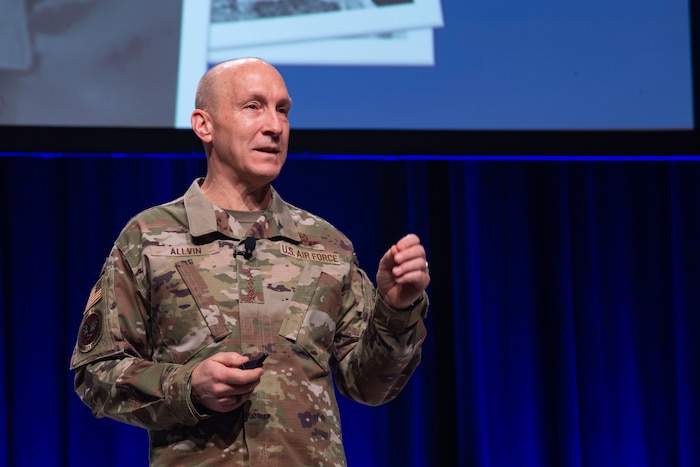Only hours after Air Force leaders announced sweeping changes to "reoptimize" the service, one of the plan's architects, Air Force Chief of Staff Gen. David Allvin, told a large and influential audience Feb. 13 that the effort kicks off in a "time of consequence" in Air Force history.
Allvin's keynote remarks at the AFA Warfare Symposium put the ambitious reoptimization in historical terms, linking it in significance to the consequential eras preceding well known shifts in Air Force history such as Doolittle's raid on Japan, the Berlin Airlift, and more historic events such as the fall of the Berlin Wall.
"Since the dawn of airpower, our proud heritage in history has been intertwined with key events in combat that have shaped … a nation and in some cases, the world. Those are seminal events," Allvin told a crowd of several thousand Airmen, Guardians, industry and elected officials, and retired personnel.
"But to me, what is more important are the times that preceded them. These are times of consequence. These are times when Airmen and air pioneers embodied what is running in our DNA - the spirit of innovation, vision, and courage. The actions of those Airmen in that time of consequence shaped those seminal events," he said.
Plans for reoptimizing the Air Force that Allvin announced Feb. 12 alongside Secretary of the Air Force Frank Kendall, Acting Under Secretary of the Air Force Kristyn Jones, and Chief of Space Operations Gen. Chance Saltzman are designed to update the way the service acts, trains, and is equipped to make sure its hard-won superiority remains and that it is postured to deter all adversaries, and if necessary, prevail in conflict in an era of great power competition.
At every point, Allvin said, novel airpower thinkers drove ideas, such as planes taking off from ships and assembling a convoy of aircraft large enough to supply an entire city for a year, into reality.
"Visionaries like these, ahead of time, took what would have been seen as a foolhardy plan and made it something that seemed worth trying. And because it was worth trying, they did it and it succeeded," he said, drawing a straight line from that history to the dramatic change the Air Force is embarking on now.
Allvin recounted one seminal change that involved him - the fall of the Berlin Wall. He was stationed in Germany as a wide-eyed lieutenant.
"This was an amazing time in history, and I will never forget that for as long as I live," he said. "The fall of the Berlin Wall was a seminal event. … Did air power contribute to it? You're damn right it did. There was relentless readiness; a demonstration that, yes, in the backdrop of the Cold War the strategic deterrence that underpinned it, our Airmen were ready to meet the challenge."
Sketching the well-known history Allvin also noted that, in real time, these historic events are not seen as such. But the quality and determination, the focus and especially performance of Air Force personnel, particularly Airmen, he said, are "crucial to success."
"What's our next seminal event? I don't know," he said. "But I do know that right now we are in a time of consequence. What we do now matters."
In relaying the Air Force's key moments in history, Allvin said focus and dedication to everyday jobs is critical. Doing that and being ready and agile, he said, ensures "that we will continue to reinvent ourselves into the future to be the most dominant Air Force in the world."
Doolittle's raid on Japan in 1942 was audacious and historic.
But it was the air power theorists and the aviation innovators, living and working in a time of consequence prior to Doolittle's Raid, that shaped the seminal event, Allvin said.
The Air Force of today must apply that same strategy and mindset to be successful. The Total Force, he said, must be comfortable theorizing, working hard, pushing boundaries, and testing new ideas.
Despite uncertainty and challenges, Allvin suggested that this history means those uncertainties and challenges will be met yet again, that the Air Force has the talent, drive, and culture to adapt, find the necessary solutions and put them to effective use.
Allvin closed with a clear, unambiguous call to action to the Total Force and to those who lead.
"This is our time of consequence. What we do, the decisions we make, the actions we take, the Airmen we lead, and the way we do it, will define that next seminal event," he said.
"We will not turn away. We will lean into it. … The stakes are high. And the time is now."







